Delta wyniosła satelitę dla wojska 16.03. o 00:26:00,122 z Cape Canaveral wystrzelona została RN Delta-4M+(5,4), która wyniosła w T+32' 50"
na orbitę o parametrach: hp=434 km, ha=44316 km, i=27,0° wojskowego geostacjonarnego satelitę
komunikacyjnego WGS-10 (Wideband Global SATCOM).
http://lk.astronautilus.pl/n190316.htm#01
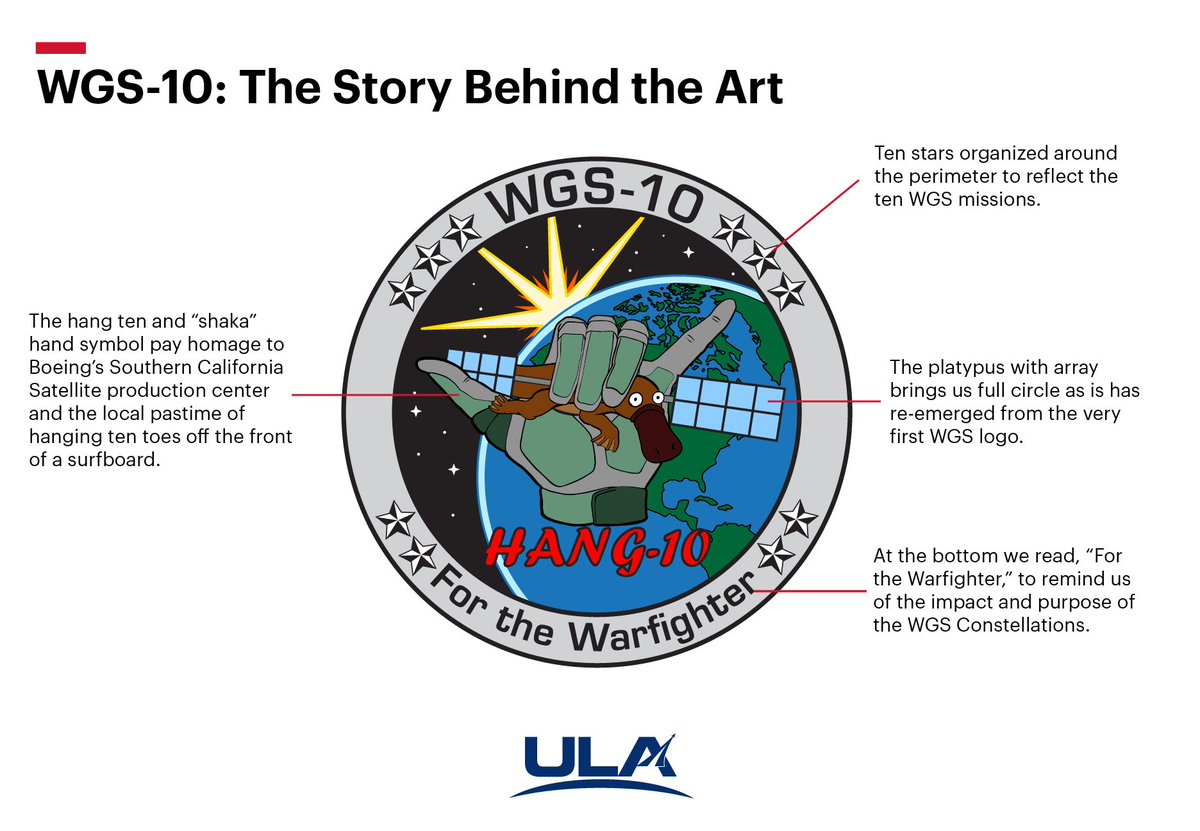
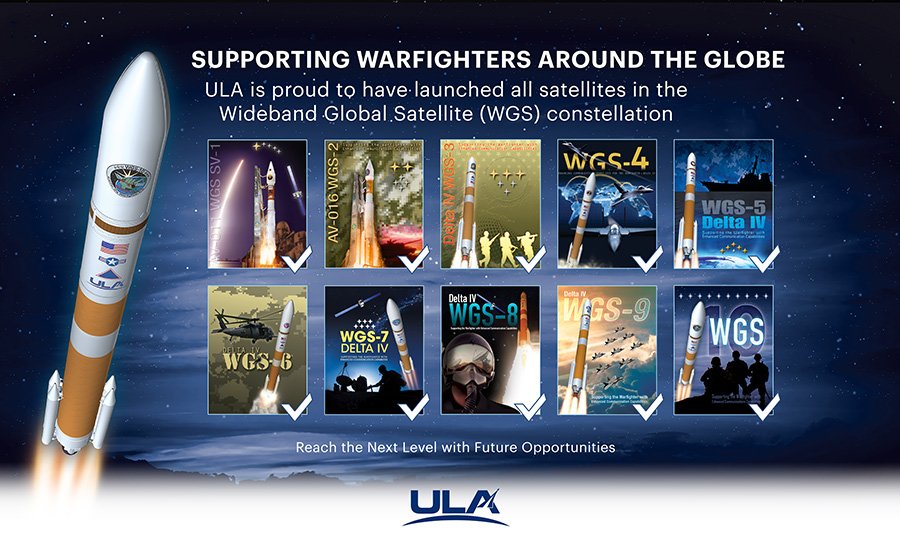 https://www.youtube.com/watch?time_continue=17&v=8eGeosLc7CIStart Delta-4M z WGS-10
https://www.youtube.com/watch?time_continue=17&v=8eGeosLc7CIStart Delta-4M z WGS-10 BY KRZYSZTOF KANAWKA ON 17 MARCA 2019
 Start Delta 4M z WGS-10 / Credits - ULA
Start Delta 4M z WGS-10 / Credits - ULASiedemnastego marca nastąpił start rakiety Delta-4M+ z wojskowym satelitą WGS-10.
Do startu doszło 16 marca o godzinie 01:26 CET z wyrzutni 37B na przylądku Canaveral. Rakieta Delta 4M+(5,4) wyniosła wojskowego satelitę telekomunikacyjnego Wideband Global Satcom – 10 (WGS-10). Start przebiegł prawidłowo. Był to ostatni start rakiety Delta 4 w tej konfiguracji. Lot został przeprowadzony dzięki United Launch Alliance (ULA).
WGS-10 ma dostarczać łączność telekomunikacyjną głównie dla amerykańskich sił powietrznych (USAF). Satelita został wyposażony w transpondery na pasmach X i Ka. Z dostępnych źródeł wynika, że jednym z zadań WGS-10 ma być komunikacja z bezzałogowymi pojazdami latającymi (UAV) nad odległymi rejonami świata i nad polami walki.
Następny start rakiety orbitalnej został zaplanowany na 22 marca. Wówczas europejska rakieta Vega wyniesie satelitę PRISMA.
(PFA, ULA)
https://kosmonauta.net/2019/03/start-delta-4m-z-wgs-10/Air Force launches WGS-10 communications satelliteby Sandra Erwin — March 15, 2019
 The Air Force's WGS-10 wideband communications satellite lifts off from Cape Canaveral aboard a ULA Delta 4 medium rocket March 15, 2019 . Credit: Jordan SirokieThis was the second to last mission for the Delta 4 medium. ULA will retire the vehicle later this summer after the launch of an Air Force GPS satellite.
The Air Force's WGS-10 wideband communications satellite lifts off from Cape Canaveral aboard a ULA Delta 4 medium rocket March 15, 2019 . Credit: Jordan SirokieThis was the second to last mission for the Delta 4 medium. ULA will retire the vehicle later this summer after the launch of an Air Force GPS satellite.The U.S. Air Force’s 10th Wideband Global Satcom communications satellite (WGS-10) atop a United Launch Alliance Delta 4 rocket blasted off on Friday at 8:26 PM EST from Space Launch Complex-37B at Cape Canaveral Air Force Station, Florida.
The Delta 4 medium “single stick” rocket — with one hydrogen-fueled common booster core, four solid rocket motors and a Delta Cryogenic Second Stage — lifted off after a delay caused by issues with NASA’s Tracking and Data Relay Satellite System. The tracking network must be available for liftoff to occur.
The $424 million WGS-10 satellite encapsulated inside a 5-meter-diameter payload fairing marked the eighth flight of the Delta 4 in the medium configuration, all of which have been WGS missions. This was the 39th launch of the Delta 4 since it was introduced in 2002. It was ULA’s 133rd mission.
The WGS constellation provides broadband communications for the U.S. military and allies. Boeing was selected as the WGS manufacturer in 2001. The first satellite was launched in 2007. Boeing delivered WGS-10 in November. On Feb. 26 it was hoisted aboard the 66.4 meters (218 feet) tall Delta 4 rocket.
Gary Wentz, ULA’s vice president of government and commercial programs, said this was the second to last mission for the Delta 4 medium, which is being retired after the 25 July launch of an Air Force Global Positioning System satellite. ULA will keep the Delta 4 heavy — which has three common booster cores strapped together — until 2024. During a conference call with reporters, Wentz said ULA is taking the medium vehicle out of service to cut costs as the company tries to become leaner to compete against lower-cost providers.
The WGS satellite weighed about 13,000 pounds at launch and its solar arrays once unfurled in space stretch 135 feet.
The spacecraft separation occurred at 9:02PM. The satellite reached a low-Earth orbit parking orbit before moving to a high geosynchronous transfer orbit. Steven Hayden, WGS chief engineer, said it would take four months for WGS-10 to get to its intended location in geosynchronous Earth orbit where it will stay and undergo tests until U.S. Strategic Command decides where it should be deployed. Hayden said the U.S. military has “plenty of slots to place the satellite around the world.”
The Air Force said the addition of a 10th satellite makes the WGS constellation the nation’s highest-capacity military communications system. It is operated by the U.S. Air Force’s 4th Space Operations Squadron at Schriever Air Force Base, Colorado. International partners participating in the WGS program include Australia, Canada, Denmark, Luxembourg, The Netherlands and New Zealand.
https://spacenews.com/air-force-launches-wgs-10-communications-satellite/Penultimate Single-Stick Delta IV to Launch USAF WGS-10 on FridayBy Ben Evans, on March 13th, 2019
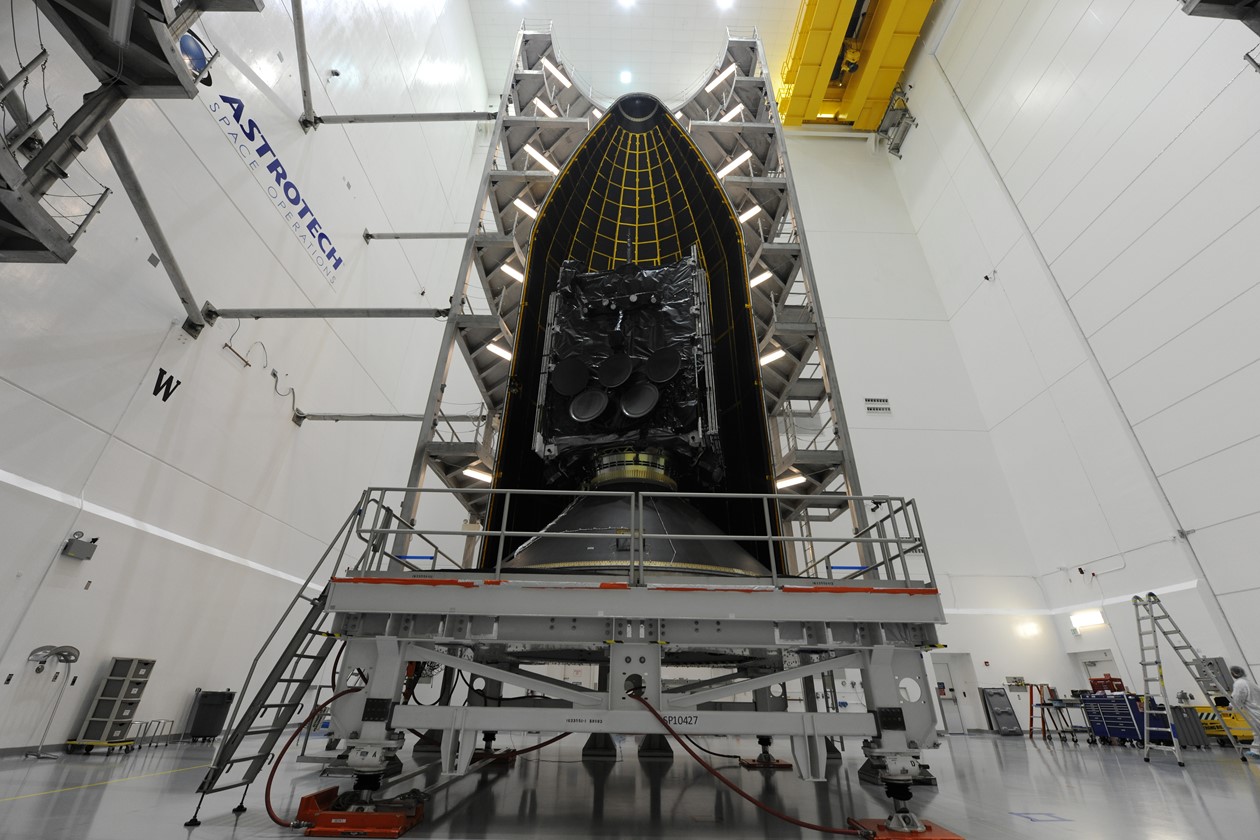 The Wideband Global Satcom (WGS) enhances the capabilities of U.S. and allied warfighters through increased bandwidth and other functionality. Photo Credit: ULA
The Wideband Global Satcom (WGS) enhances the capabilities of U.S. and allied warfighters through increased bandwidth and other functionality. Photo Credit: ULAIn keeping with tradition, this particular Delta IV vehicle is dedicated to a late ULA employee; in this case, Kurt Huschle, who held critical roles during a 30-year aerospace career and was the electrical installations lead for the Delta IV.
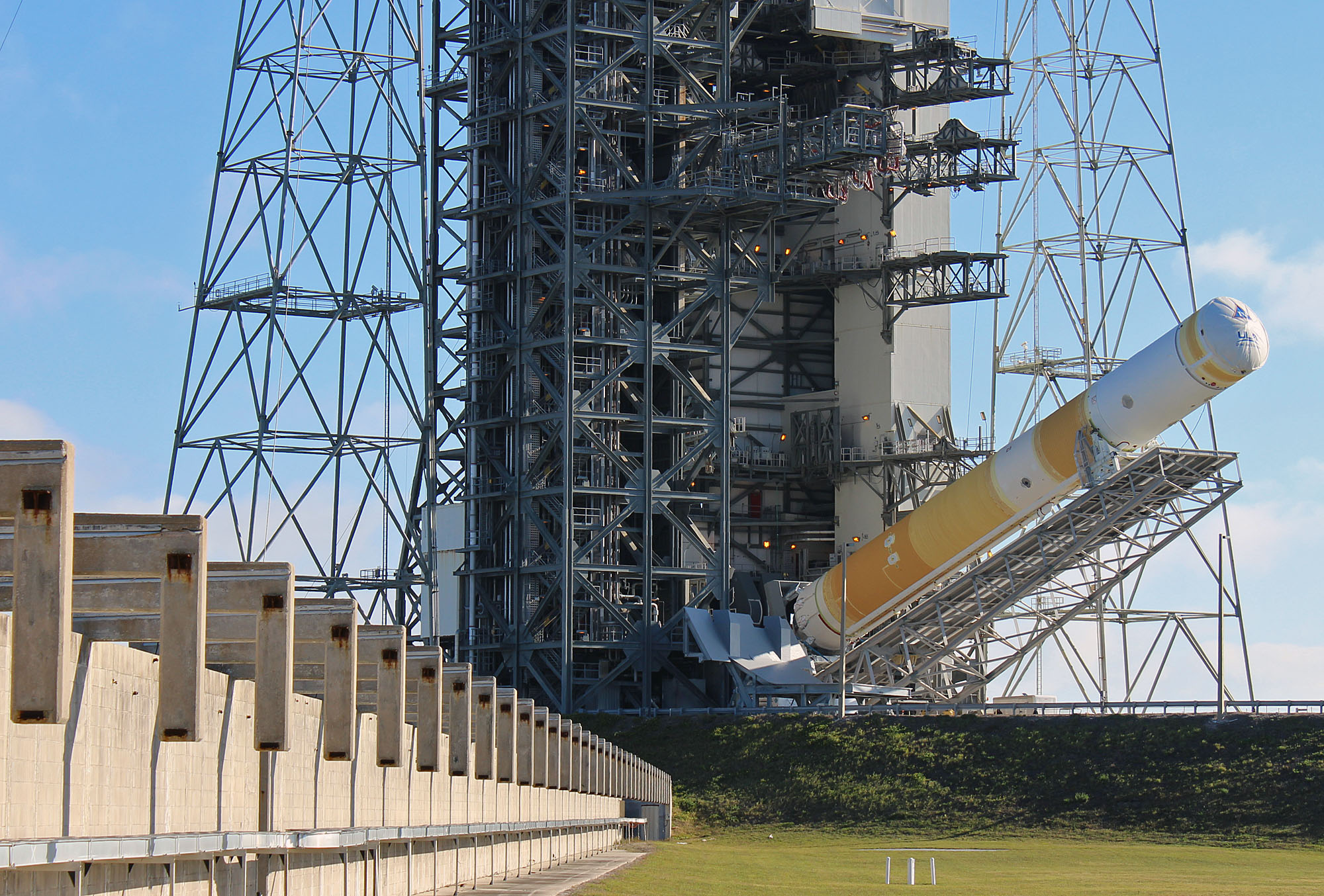 The Common Booster Core (CBC) for the WGS-10 mission is raised to the vertical at SLC-37B. Photo Credit: ULA
The Common Booster Core (CBC) for the WGS-10 mission is raised to the vertical at SLC-37B. Photo Credit: ULAAlongside its fleet of Atlas V vehicles, ULA has steadily phased-out the expensive single-stick variants of the Delta family in recent years. After three decades of near-impeccable service, the Delta II launched its last mission back in September 2018. Following the final mission of the Delta IV Medium+ (5,4) with WGS-10—configured with a 16-foot-wide (5-meter) payload fairing and four Northrop Grumman-built GEM-60 solid-fueled boosters—the sole remaining single-stick Delta IV, the Medium+ (4,2), with two strap-on GEM-60s, will fly its swansong in July 2019 with the second Global Positioning System (GPS) Block III satellite.
“ULA made the decision to retire the Delta IV Medium launch vehicle when our National Security Space customer decided to compete missions in 2015,” explained ULA director and general manager of launch operations Tony Taliancich, in comments provided to AmericaSpace. “Prior to the acquisition strategy change, ULA was required by the government to maintain two families of launch vehicles to meet assured access to space policy requirements. In a competitive environment, ULA must favor its lowest-cost product to meet the market requirements. Maintaining multiple product lines would lead to lower launch rates and higher costs.” (...)
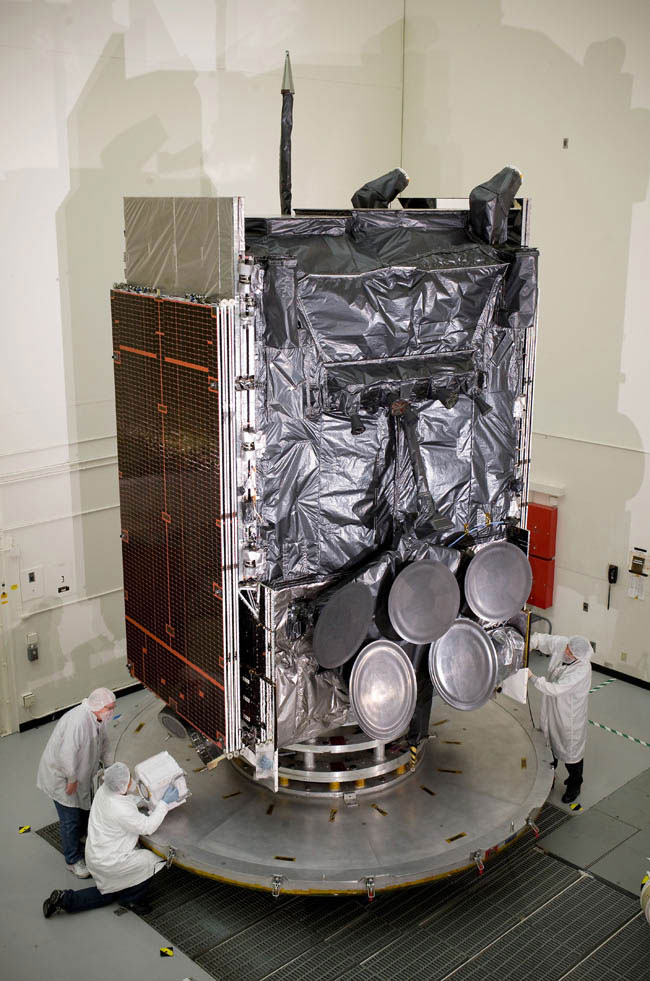 A Wideband Global Satcom (WGS) is pushed along the assembly floor at Boeing’s plant in El Segundo, Calif. Note dish antennas by technicians for scale. Photo Credit: Boeinghttps://www.americaspace.com/2019/03/13/penultimate-single-stick-delta-iv-to-launch-usaf-wgs-10-on-friday/ULA's Penultimate Delta IV Lofts WGS-10 to Orbit for USAF
A Wideband Global Satcom (WGS) is pushed along the assembly floor at Boeing’s plant in El Segundo, Calif. Note dish antennas by technicians for scale. Photo Credit: Boeinghttps://www.americaspace.com/2019/03/13/penultimate-single-stick-delta-iv-to-launch-usaf-wgs-10-on-friday/ULA's Penultimate Delta IV Lofts WGS-10 to Orbit for USAFBy Ben Evans, on March 16th, 2019
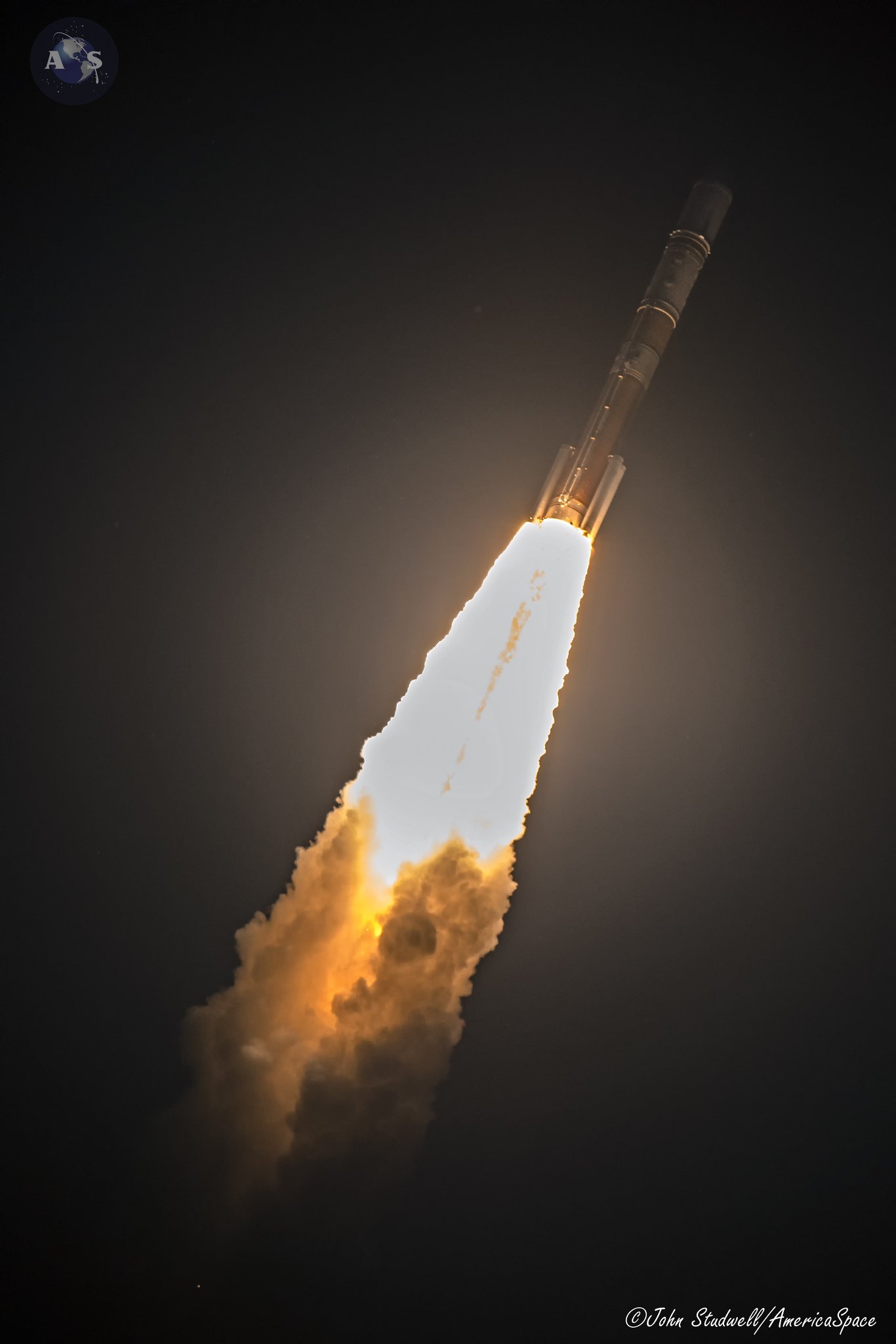 The U.S. Air Force WGS-10 satellite headed to orbit atop the penultimate single-stick United Launch Alliance Delta-IV rocket on March 15, 2019. Photo Credit: John Studwell / AmericaSpace
The U.S. Air Force WGS-10 satellite headed to orbit atop the penultimate single-stick United Launch Alliance Delta-IV rocket on March 15, 2019. Photo Credit: John Studwell / AmericaSpace(...) The Common Booster Core (CBC) for today’s flight was delivered to the Cape last July, alongside the Delta Cryogenic Second Stage (DCSS), for horizontal integration at Space Launch Complex (SLC)-37B. In late January, the 170-foot-long (51.8-meter) stack was raised to the vertical on the pad surface and in the first half of February the four GEM-60s were mounted around the CBC’s base. At the end of last month, the WGS-10 satellite—encapsulated within its bulbous payload fairing—was installed atop the vehicle, raising the height of the Delta IV Medium+ (5,4) to 218 feet (66.4 meters). Following the completion of the Launch Readiness Review (LRR) on Thursday, 14 March, the Mobile Service Tower (MST) was retracted in the hours prior to launch.
The weather outlook, according to the 45th Space Wing, was highly favorable, with an 80-percent likelihood of acceptable conditions at T-0, tempered only by a slight risk of infringing the Cumulus Cloud Rule. The skies, however, cooperated wonderfully, while engineers had to troubleshoot some minor issues on the booster and deal with the TDRSS problem.
With those issues dealt with the countdown emerged from its final built-in hold at T-4 minutes and counted down to one minute, whereupon the Range Operations Co-ordinator (ROC) reported that the Eastern Range was “Green”, with no constraints for launch. At T-14 seconds, the Radial Outward Firing Igniters (ROFIs) were activated, sizzling sparkler-like to burn off excess hydrogen, before the liquid oxygen and hydrogen valves of the RS-68A engine opened a few seconds before T-0. (...)
https://www.americaspace.com/2019/03/16/ulas-penultimate-delta-iv-lofts-wgs-10-to-orbit-for-usaf/https://www.nasaspaceflight.com/2019/03/ula-delta-iv-wgs-10-launch-cape-canaveralPhotos: Mobile gantry retracted at Delta 4 launch padMarch 15, 2019 Stephen Clark

 Credit: Walter Scriptunas II / Spaceflight Nowhttps://spaceflightnow.com/2019/03/15/photos-mobile-gantry-retracted-at-delta-4-launch-pad/https://spaceflightnow.com/2019/03/13/ula-plans-to-ring-in-the-weekend-with-friday-night-launch/
Credit: Walter Scriptunas II / Spaceflight Nowhttps://spaceflightnow.com/2019/03/15/photos-mobile-gantry-retracted-at-delta-4-launch-pad/https://spaceflightnow.com/2019/03/13/ula-plans-to-ring-in-the-weekend-with-friday-night-launch/383rd Delta rocket launch since 1960
39th Delta 4 rocket mission since 2002
8th Delta 4-Medium+ 5,4 configuration to fly since 2009
61st main engine from RS-68 family launched
19th RS-68A main engine flown
62nd, 63rd, 64th and 65th GEM-60 solid rocket motors flown
31st Delta 4 rocket launch from Cape Canaveral Air Force Station
10th Wideband Global SATCOM satellite launch
8th Wideband Global SATCOM satellite to launch on Delta 4
133rd United Launch Alliance mission since the company's formation in 2006
2nd ULA launch this year
2nd Delta 4 launch in 2019
3rd launch from Cape Canaveral in 2019
https://spaceflightnow.com/2019/03/15/delta-383-mission-status-center/https://spaceflightnow.com/2019/03/15/delta-4-rockets-launch-timeline-with-wgs-10/ ULA@ulalaunch 15 mar 2019
ULA@ulalaunch 15 mar 2019
This illustration depicts the flow of hardware and the facilities involved to vertically integrate the #DeltaIV rocket and #WGS10 spacecraft for today's launch.
https://twitter.com/ulalaunch/status/1106594324823851009Artykuły astronautycznehttps://space.skyrocket.de/doc_sdat/wgs-8.htm